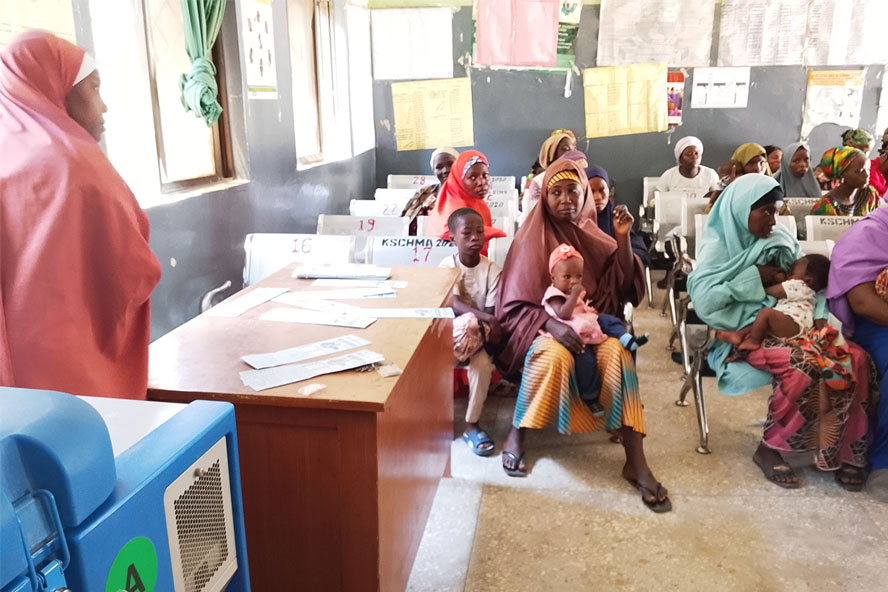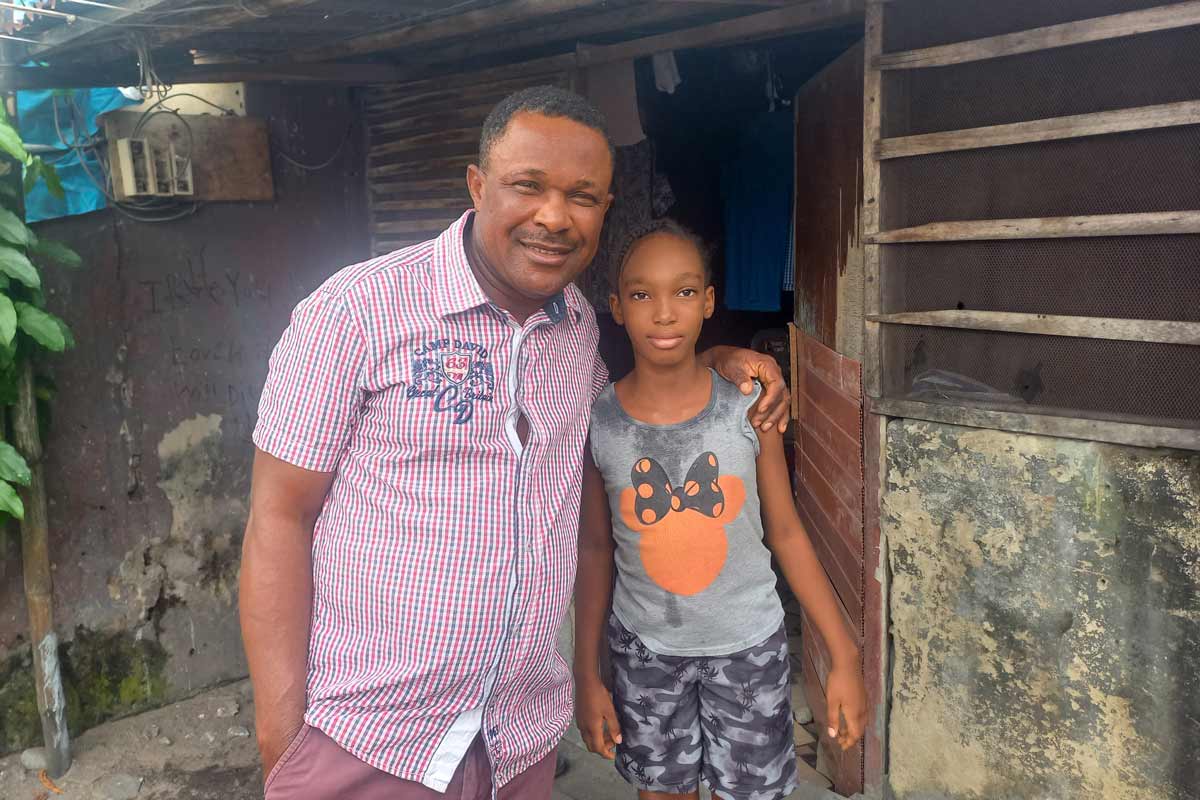In Katsina, Nigeria, a homegrown mobile app is helping get vaccines to vulnerable kids
A locally-designed digital health solution is bridging the gap between unimmunised children in underserved communities in Katsina State and health facilities.
- 14 July 2025
- 8 min read
- by Afeez Bolaji
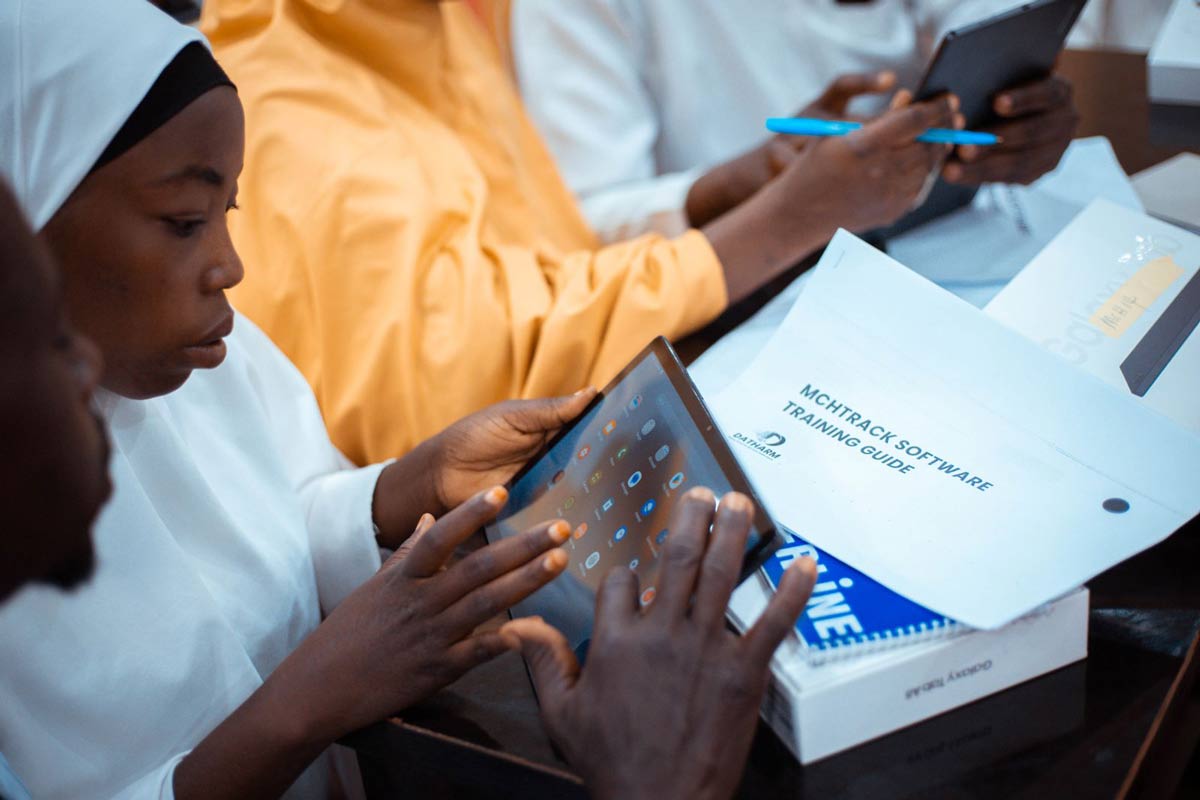
On a Friday in late June, Maryam Shehu and Aisha Tukur Gambo entered a home on the outskirts of Katsina city in northwestern Katsina State, to check on Amina Adamu’s child. The child had received the measles, yellow fever and meningitis vaccines a few days earlier, and the two Community Health Influencers, Promoters and Services (CHIPS) programme agents wanted to be sure Adamu knew when his next jabs were due.
It was only noon, but already Shehu and Gambo were on their fifth home visit of the day. A week’s work for the pair involved tens upon tens of visits – and not long ago, each encounter needed to be manually written up in a record book, which then had to be hauled to the health facility. That process sometimes resulted in loss of data in transit. But in 2023, a digital health application called MCHTrack, developed by local social-tech organisation Datharm, changed that.
Now Gambo was tapping information into a tablet while she delivered health information – spiced with intermittent humour – to the child’s mother. “There is everything we want to do inside this tablet. We use it to register new households, make referrals, track whether registered persons visit the health facility, send reminders, and more. Routine immunisation is usually conducted every Wednesday at the health facility. We visit families whose children are due for immunisation a day or two before that day to remind them. We also remind pregnant women of their next ANC appointment,” Gambo told VaccinesWork.
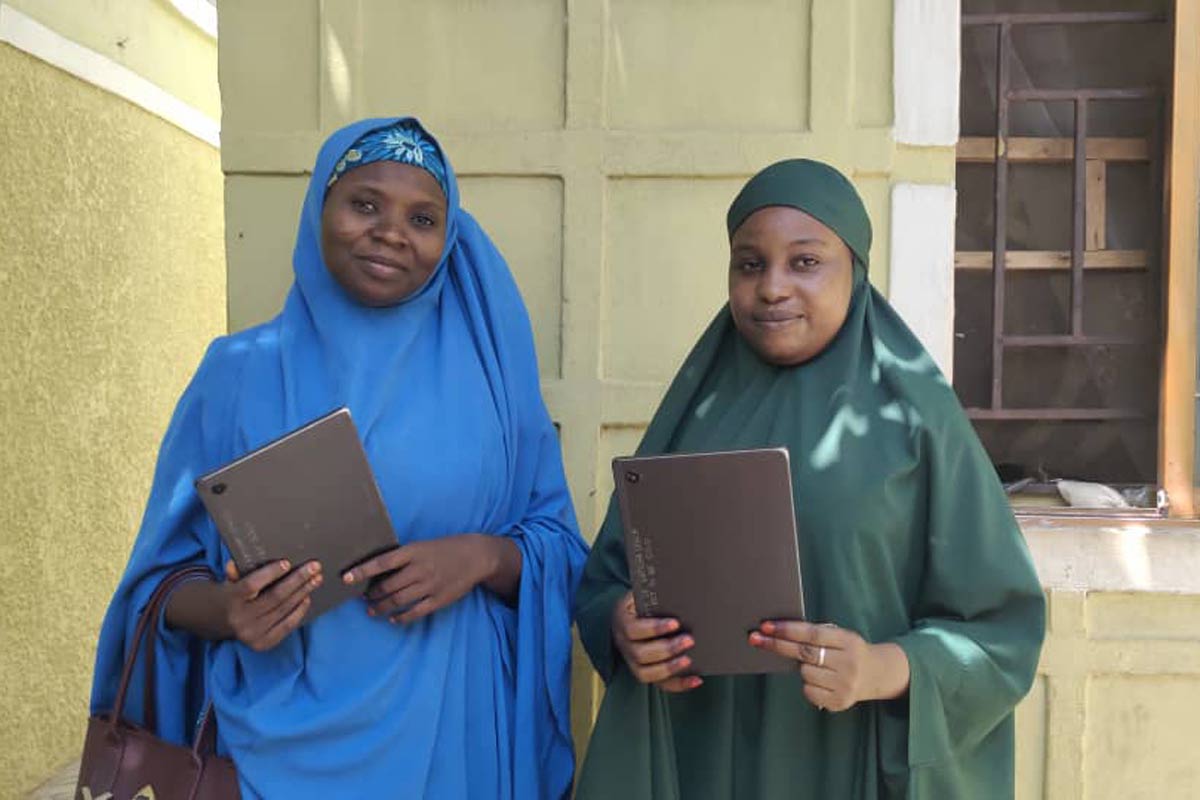
Keeping kids on track
In partnership with the Katsina State Primary Health Care Agency (KSPHCA), UNICEF and funding from Gavi Health System Strengthening programme, MCHTrack has since been rolled out across seven local government areas (LGAs) in Katsina that have been identified as housing a disproportionate number of unimmunised children.
The app is installed on tablets provided by the KSPHCA and works on three linked levels: at the grassroots, community health agents use it to register settlements, households, women of childbearing age and children, and to make referrals to health facilities. At hospitals, health workers act on those referrals, document services rendered and give feedback on whether the referred persons come or not. The app is also linked to a dashboard that collates all the data.
MCHTrack has seen a significant increase in the number of women attending hospitals and has bolstered immunisation, especially helping reach unimmunised zero-dose children in underserved, hard-to-reach communities, Gambo explained, citing several cases she had referred.
“I met a boy older than a year who had never been immunised and referred him to the health centre. His mother said he had exceeded the age limit for immunisation, but I disagreed with her, counselled her and insisted she take him there. The boy was immunised in my presence. I kept reminding [his mother] of the next appointments and monitoring the progress through MCHTrack until her child was fully immunised,” she disclosed.
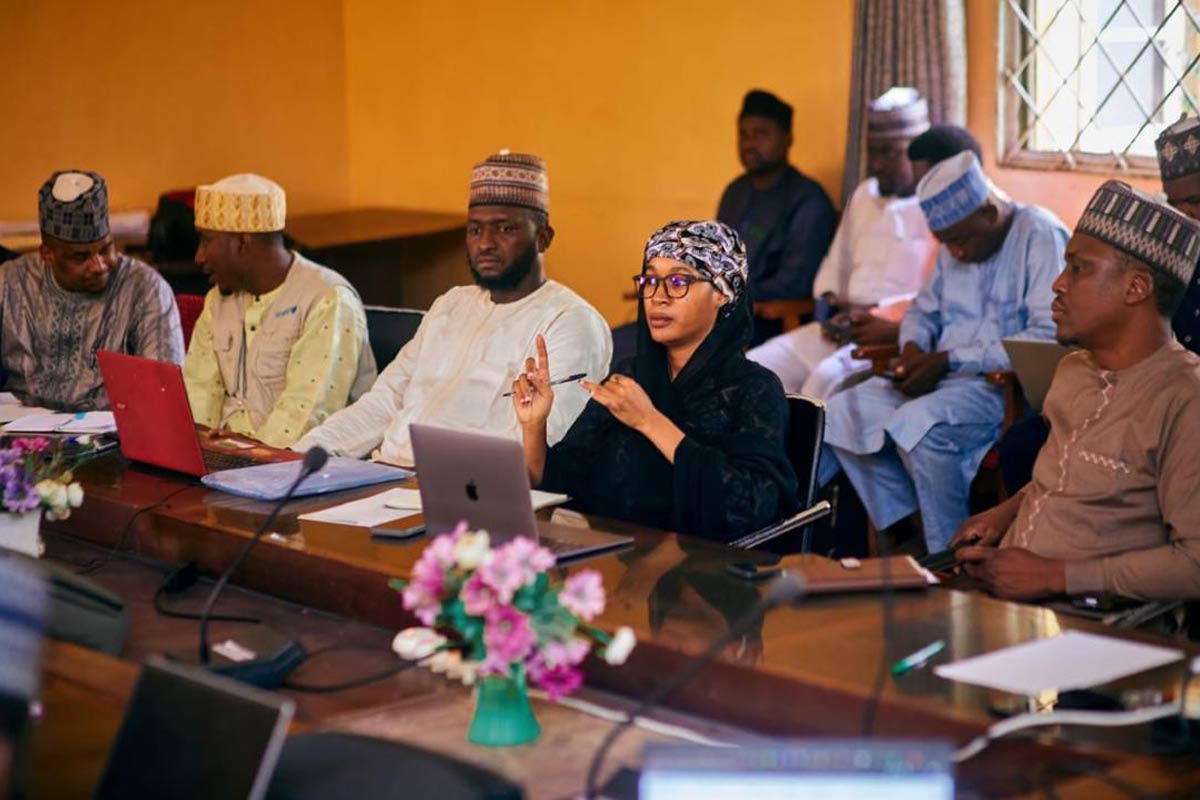
Tracking transformation
Despite significant improvements over the last 30 years, Nigeria’s maternal mortality rate remains at 993 deaths per 100,000 live births, the second-highest in the world. The northwestern and northeastern regions of the country report the highest rates of death in childbirth and pregnancy.
Infants and children are also under-protected in Nigeria. At least 64% of children between ages 12 and 23 months in Nigeria did not receive all recommended vaccines in 2021, and only 62% of children received the third dose of the basic diphtheria, tetanus and pertussis-containing vaccine in 2023. The northwest region reports the lowest immunisation coverage in Nigeria.
That’s data MCHTrack hopes to see transformed. The app was piloted in 2019 in two health facilities with the express of aim of seeing what technology could do to help address maternal mortality, said the founder of Datharm, Amina Ahmad Nagogo.
“We wanted to see if we could use a digital tool to line-list women and track the process of pregnancy from inception through the antenatal care services to birth at health facilities, identifying at-risk pregnancies and ensuring the required health services are rendered in the process,” she explained, adding that the Katsina state government embraced the app after a successful test run, before it was scaled up to also track immunisation.
“We have rolled out MCHTrack in 76 wards, and enlisted over 450 settlements in seven out of the eight [high] zero-dose LGAs in Katsina, leveraging community resource groups. These include VCMs [voluntary community mobilisers] and CHIPS agents engaged by UNICEF and the state government, respectively.
“The community agents reside within these communities and if there are defaulters who do not comply with referrals, they advise and counsel them. Reasons for defaulting are recorded, and serve as insights to understand why certain communities are not accessing health services and what targeted interventions can be made.
“Last year, we found out that certain communities were not going to the health facility because of distance and lack of transport. The Katsina State Primary Health Care Agency (KSPHCA) requested the data and leveraged it to organise an outreach for zero-dose children in those communities, together with the health facility,” Nagogo said.
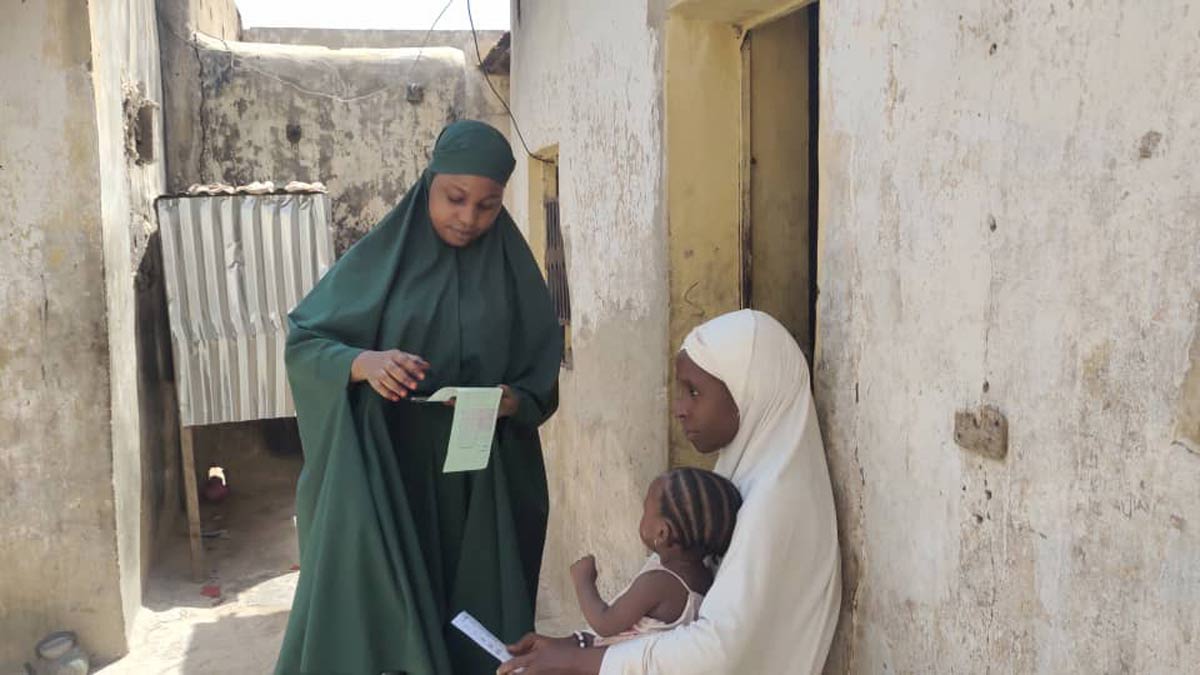
The right track
Katsina is one of eight states that signed an agreement with Gavi on primary healthcare strengthening in back in 2022, says KSPHCA Executive Secretary, Dr. Shamsuddeen Yahaya. Since then, the government has been coming up with innovative ways to reach previously unimmunised children with vaccines, and improve other key primary health care indicators such as antenatal care attendance and facility-based births.
“One of the reasons pregnant women die is because they don’t go to the facility to deliver. That is why we have very high maternal mortality in Katsina and many of the northwestern states. But with the use of this technology, a lot of women are being referred and linked to the facility. They are linked up right from ANC, to delivery, and postnatal.
“We partner with Datharm and they deploy their innovative technology while we provide tablets for CHIPS agents to identify pregnant women and children, who are supposed to receive routine immunisation, and refer them to health facilities,” he added.
Mustapha Lawal, MCHTrack Project Coordinator in Katsina, reports 152 CHIPS agents, plus VCMs and two health workers from each facility have been trained in the use of the app. This has led to some remarkable progress in maternal and child health care, he says.
“So far, MCHTrack has registered 9,379 women and 17,250 children. It has referred 16,070 persons, out of which 12,724 were children and 3,346 were women. 9,913 or 78% of the children were referred for routine immunisation. We have also recorded 26,109 hospital visits comprising 20,657 children, out of which 14,027 received routine immunisation and 4,856 received other services, while 5,452 women received ANC and other services. We have also identified 2,460 zero-dose children and resolved 1,806 cases, representing a 71% success rate. We have tracked 362 defaulters and resolved 70.79% of the cases,” Lawal reveals.
Innovations including MCHTrack have seen immunisation coverage in Katsina leap over the past five years, Yahaya told VaccinesWork, citing data from the Demographic Health Survey (DHS) progress tracker.
“According to the DHS, the number of children fully immunised in Katsina increased from 21% in 2018 to 45% in 2023/2024; the number of children who received measles (MCV1) vaccinations jumped from 35% to 54%; DPT1 vaccinations rose from 43% to 60%, while DPT3 vaccinations increased from 34% to 53% during the period. We are currently focusing on eight out of 34 LGAs in the state and we plan to scale the programme to other LGAs once we get more funds,” Yahaya said.
Bumps in the road
Despite these impressive results, the digital innovation has faced challenges, ranging from insecurity in some areas, to technical glitches. Datharm and the state government have found the means – which range from technical fixes to the deployment of old-fashioned street-smarts – of managing these obstacles.
“In security-compromised areas, CHIPS agents and VCMs go out on specific days which usually coincide with market days when there is a lot of movement of people and more presence of security personnel. Also, some workers, especially the CHIPS agents, initially struggled with the application usage, but after training and retraining, they caught up and everything started going very well.
“There is an issue of internet connectivity sometimes, but the application is designed in such a way that it can work even when there is no adequate network. It was designed to work offline and upon availability of network, it synchronises [data] automatically. So lack of network service will not limit them from doing their work,” Lawal said.
Have you read?
Women share encounters with app
Several women VaccinesWork spoke to highlighted how the MCHTrack has helped encourage them to seek healthcare services. During CHIPS agent Shehu and Gambo’s visit to her house, Adamu remarked that she and her children have been consistently embracing medical care through MCHTrack.
“I registered for antenatal care and visited the hospital regularly because of the constant reminders by the community health agents. I gave birth to my two children at the health centre.
“The app now makes me take antenatal care very seriously, and I have never missed my children’s immunisation schedule. My last child received three vaccines a few weeks ago. I am waiting for her next appointment,” she added.
Being enrolled in the digital mobile application is also paying off for Maryam Sulaiman, a mother of four from Saronkuka community.
“It helps me and my children to stay healthy. When one of my children had measles, it was traced to incomplete vaccination. A CHIPS agent kept monitoring her with the app until she completed her immunisation. I’ve noticed that she barely falls sick and now realise that vaccines can prevent or reduce the seriousness of many childhood diseases,” she said.

